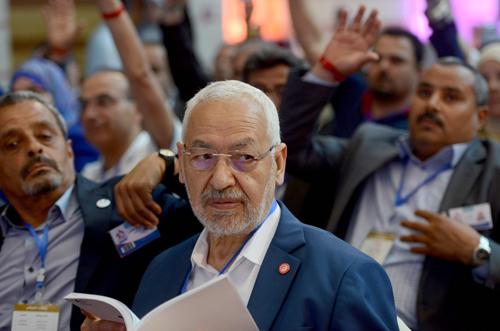You are here
Tunisia’s Ennahda to separate politics from religious activity
By AFP - May 19,2016 - Last updated at May 19,2016
TUNIS — Tunisia's Islamist Ennahda Party will separate its religious activities from political ones, its chief said in statements published Thursday ahead of a weekend congress to formalise the change.
Rached Ghannouchi, an intellectual who once advocated a strict application of Islamic sharia law, told French daily Le Monde there was no room left in post-Arab Spring Tunisia for "political Islam".
"Tunisia is now a democracy. The 2014 constitution has imposed limits on extreme secularism and extreme religion," he was quoted as saying.
"We want religious activity to be completely independent from political activity.”
"This is good for politicians because they would no longer be accused of manipulating religion for political means and good for religion because it would not be held hostage to politics", said Ghannouchi.
His comments come on the eve of a three-day congress for Ennahda, which is part of a coalition government.
Leaders say the congress will take the formal step of making the separation between political and religious activities.
Ghannouchi, who is expected to be re-elected as party head barring any last-minute surprise, said: “We are going towards a party which specialises in political activities.
“We are leaving political Islam and entering democratic Islam. We are Muslim democrats who are no longer claim to represent political Islam,” he added.
He described Ennahda as a “political, democratic and civil party” but said its point of reference remain rooted in the values of ancient and modern Islam.
Ghannouchi and other intellectuals inspired by Egypt’s Muslim Brotherhood in 1981 founded the Islamic Tendency Movement, which became Ennahda in 1989.
The party was persecuted under the regime of strongman Zine Al Abidine Ben Ali and his predecessor Habib Bourguiba.
Ghannouchi was sentenced to jail under Bourguiba and lived in exile for 20 years, returning home after the 2011 Arab Spring uprising ousted Ben Ali.
He received a triumphant welcome from supporters and won the post-revolution election in October 2011, but two years later Ghannouchi had to step aside amid a deep political crisis.
Related Articles
TUNIS, Tunisia — Tunisia’s Islamist Ennahda Party voted Monday to separate its political and religious work, part of its effort to cast itse
TUNIS — The leader of Tunisia's Islamist-inspired Ennahdha party, Rached Ghannouchi, was elected parliament speaker on Wednesday, a mon
Blaring music and flags fill the hall where Tunisia's Initiative Party is warming up to test its chances in the second free election since the 2011 "Arab Spring" uprising that ousted autocrat Zine Al Abidine Ben Ali.
















